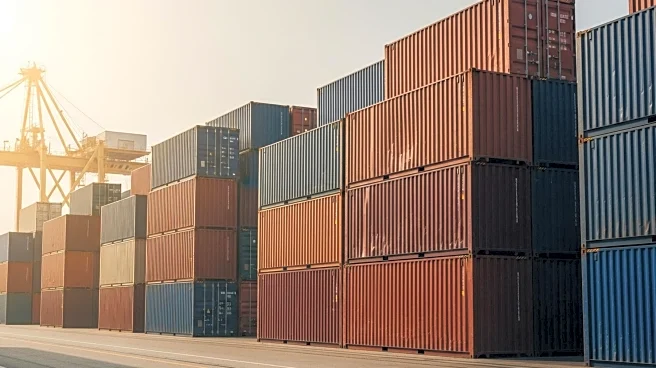What's Happening?
China's customs agency reported a slowdown in export growth for August, marking a 4.4% increase compared to the same month last year, down from a 7.2% rise in July. This deceleration is attributed to ongoing trade tensions and tariffs imposed by the United States. President Trump has implemented a 30% tariff on Chinese imports, which has led to a significant decrease in trade between the two nations. Chinese exports to the U.S. fell by 33% to $47.3 billion, while imports from the U.S. dropped by 16% to $13.4 billion. Despite these challenges, China's exports to the European Union increased by 10.4% to $46.8 billion, although imports from the EU slightly decreased. The trade surplus for China in the first eight months of the year was $785.3 billion, highlighting the ongoing trade imbalance.
Why It's Important?
The slowdown in China's export growth is significant as it reflects the impact of trade tensions between major global economies. The tariffs imposed by the U.S. are intended to address trade imbalances and protect domestic industries, but they also risk escalating economic conflicts. The reduction in trade between China and the U.S. could lead to job losses in manufacturing sectors reliant on exports. Additionally, the trade surplus with the EU indicates shifting trade dynamics, which could influence global economic policies and negotiations. The situation underscores the interconnectedness of global markets and the potential for economic ripple effects across industries and regions.
What's Next?
The ongoing trade negotiations between China and the U.S. are crucial in determining future economic relations. Both countries are engaged in talks to reach a trade agreement that could alleviate some of the tensions and potentially reverse the tariffs. The outcome of these discussions will likely impact global trade policies and economic strategies. Stakeholders, including businesses and policymakers, are closely monitoring these developments to assess potential changes in trade regulations and market conditions.
Beyond the Headlines
The trade tensions have broader implications for global supply chains, particularly in industries reliant on rare earths, which are essential for manufacturing various high-tech products. China's dominance in the rare earth market and its recent clampdown on exports have raised concerns about supply chain disruptions. The negotiations between China and the U.S. also involve discussions on rare earth exports, highlighting the strategic importance of these materials in international trade and technology development.










